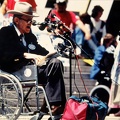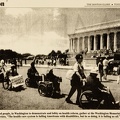Nation
THE BOSTON GLOBE
TUESDAY, MAY 3,1994
[Headline] Disabled people hold health rally
By Bob Hohler
GLOBE STAFF
WASHINGTON — Chanting "Free our people now," the protesters marched with canes and crutches, followed seeing-eye dogs and rolled in wheelchairs to the capital yesterday to press for comprehensive health care for nearly 50 million Americans with disabilities.
More than 1,000 of those with disabilities and their advocates joined the "Bridge to Freedom" parade from Arlington National Cemetery to the Lincoln Memorial, a route many had marched four years ago to push for the Americans with Disabilities Act.
At a rally, they called on Congress to pass a health-care bill that includes a national system of personal attendant services, durable medical equipment, assistive technology, psychiatric care and prescription drugs. An estimated 1.7 million people with disabilities are in nursing homes, a number that could be cut through a comprehensive health plan, many activists said.
One member of the crowd described the issues as a matter of life or death. "I spent 21 years, four months and two weeks of my life in an institution," said Sybil Feldman, 53, of Brookline, who rode her wheelchair to the rally. "It means everything to me to be on my own. If I had to go back, I'd kill myself."
[Subheading] 1,000 protesters make an appeal to Congress
At a White House ceremony before the march, President Clinton told 125 of the activists that he supported their goals.
"The health-care system is failing Americans with disabilities, but in so doing, it is failing us all," Clinton said. "It is making us less productive and less strong. It is costing more tax dollars and robbing us of taxes that would come to America's treasury from more Americans working and paying taxes in the ordinary course of their lives."
Several people with disabilities from Mass-achusetts who attended the ceremony vowed to press Congress to pass Clinton's health-care bill.
"He wants to make life better not only for the disabled but for their families and society in general," said Julie Nolan of Falmouth, an advocate for the Cape Organization for the Rights of the Disabled.
Nolan, Pam Burkley and Leo Lucas said they feared that lobbyists might jeopardize services for those with disabilities. "If I lost my personal-care attendant, I wouldn't be able to work or care for my daughter and I would end up on" welfare, said Burkley, who works for an independent-living center in Hyannis.
"I would be back in an institution," said Lucas, who said he was able to "break out" of such care because he received aid from a personal-care attendant. Other marchers, including Michael Muehe of Boston, expressed concern over the prospect of a health bill that limited care for people with "pre-existing conditions."
"That would legalize discrimination," said Muehe, executive director of Cambridge's disability commission. Muehe, who uses a wheelchair, said he hoped health-care reform also would lead to broad coverage to replace wheelchairs and other durable equipment. "As it is now," he said, "we constantly have to ask, 'What's covered this week?'
Sen. Torn Harkin, Democrat of Iowa and chief sponsor of the Americans with Disabilities Act, urged the crowd to march on Congress and demand that comprehensive health care for people with disabilities not be negotiable.
Sen. Edward M. Kennedy pledged his support in a statement that was read to the crowd.
"Many of you have had to leave successful careers, spend your families into poverty or be told to place a loved one in an institution because that is what the insurance rules dictate," said Kennedy's statement, which described such rules as "unacceptable."
- Created on
- Tuesday 16 July 2013
- Posted on
- Wednesday 7 August 2019
- Visits
- 380
- Rating score
- no rate
- Rate this photo


0 comments